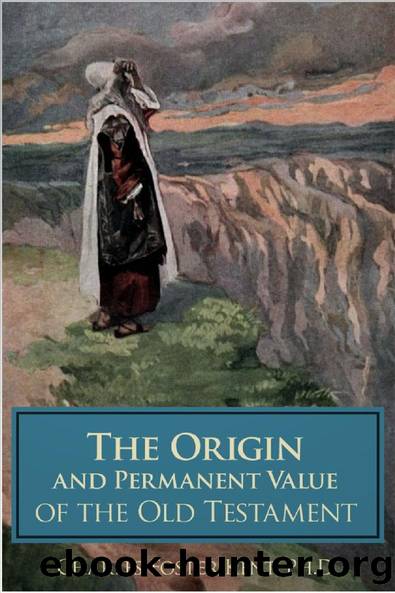The Origin and Permanent Value of the Old Testament by Charles Foster Kent

Author:Charles Foster Kent
Language: eng
Format: epub
Tags: history, the old testament, bible, biblical, study, hebrew, torah, koran, religion
ISBN: 9781781669006
Publisher: Andrews UK Limited 2012
Published: 2012-06-20T00:00:00+00:00
IX
INFLUENCES THAT GAVE RISE TO THE PRIESTLY LAWS AND HISTORIES
[Sidenote: Influences in the exile that produced written ceremonial laws]
The Babylonian exile gave a great opportunity and incentive to the further development of written law. While the temple stood, the ceremonial rites and customs received constant illustration, and were transmitted directly from father to son in the priestly families. Hence, there was little need of writing them down. But when most of the priests were carried captive to Babylonia, as in 597 B.C., and ten years later the temple was laid in ruins and all sacrifice and ceremonial worship suddenly ceased, written records at once became indispensable, if the customs and rules of Israel's ritual were to be preserved. The integrity and future of the scattered Israelitish race also largely depended upon keeping alive their distinctive traditions. Torn from their altars, the exiled priests not only had a strong incentive, but likewise the leisure, to write. The ritualistic zeal of their Babylonian masters doubtless further inspired them. The result was, that during the Babylonian exile and the following century most of the ceremonial laws in the Old Testament appear to have been first committed to writing.
[Sidenote: Ezekiel's Code]
Even Ezekiel, the prophet of the early exile, yielded to the influence of his early priestly training and the needs of the situation. In 572 he issued the unique code found in chapters xl.-xlviii. of his prophecy. It provides for the rebuilding of the temple, and defines the duties of its different officials and the form of ritual that is to be observed. The whole is intended primarily to emphasize, through the arrangement of the sanctuary and the forms of the ceremonial, the transcendent holiness of Jehovah. Ezekiel also proclaims, through this elaborate program for the restored community, the certainty that the exiles would be allowed to return and rebuild the temple. He evidently reproduces many of the proportions and regulations of the first temple, but, with the same freedom that characterizes the authors of the Deuteronomic codes, he unhesitatingly sets aside earlier usages where something better has been revealed.
[Sidenote: Genesis and character of the Holiness Code]
Ezekiel's code was never fully adopted by the later Jews, for much of it was symbolic rather than practical; but it powerfully influenced subsequent lawmakers, and was indicative of the dominant tendency of the day. Even before he issued his code, some like-minded priest had collected and arranged an important group of laws, which appear to have been familiar to Ezekiel himself. They are found in Leviticus xvii.-xxvi., and have felicitously been designated as the Holiness Code, because they constantly emphasize the holiness of Jehovah and the necessity of the people's being holy in thought and act. In chapters xvii.-xix. most of the original laws are still arranged in the decalogue and pentad form. This strong evidence that they had been transmitted by word of mouth from a much earlier period is supported by their contents. They resemble and supplement the primitive laws of Exodus xx. 23 to xxiii.
Download
This site does not store any files on its server. We only index and link to content provided by other sites. Please contact the content providers to delete copyright contents if any and email us, we'll remove relevant links or contents immediately.
Twelve Days of Christmas by Debbie Macomber(3021)
The Kiss of Deception by Mary E. Pearson(2382)
ESV Study Bible by Crossway(2088)
Waking Up by Sam Harris(1958)
7-14 Days by Noah Waters(1733)
Holy Bible (NIV) by Zondervan(1715)
The Harvest: Taken by M.A. Church(1572)
21 (The List Series) by Rhonda James(1487)
The King James Study Bible by Thomas Nelson(1472)
Warrior of the Light by Paulo Coelho(1244)
King of Kings by Unknown(1231)
Savage (Apex Predator Book 2) by David Meyer(1214)
My Daily Catholic Bible, NABRE by Thigpen Edited by Dr. Paul(1207)
Bound by You(1190)
The Falls by Unknown(1140)
The Holy Bible by King James Version(1110)
Proverbs by Zondervan(1094)
Good with Words by Patrick Barry(1091)
Agradecimientos by(1083)
